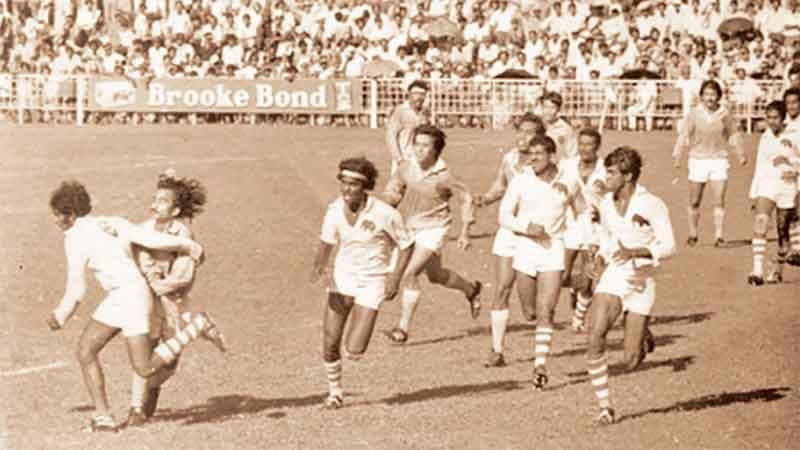
When will this happen again? Sri Lanka became runner-up to Japan in the 1974 Rugby Asiad as it also marked the first-ever held in this country and the host team enjoyed one of the finest moments on the rugby field finishing second to Japan.
In that Asiad, Sri Lanka was drawn into group ‘A’ along with Malaysia, Laos, and Singapore while Japan, South Korea, Hong Kong and Thailand were in group ‘B’. The Sri Lankans who emerged group leaders after beating Malaysia, Laos and Singapore had to meet Japan, the Group “B’ winners, in the final.
In this Asiad, Indrajith Coomaraswamy led the Sri Lanka side and late Col Bertie Dias one of the finest rugby coaches in the country was in charge of the team.
Nobody will grudge if the credit should go to late Bertie Dias, who took great pains to mould the team into a formidable outfit.
It is said that YC Chang was tipped to lead the country, but he was deprived of this opportunity because he was suspended for walking out of a game with his CH & FC team.
That was the level of discipline at that time. At the end of the tournament Japan emerged champions and Sri Lanka the proud runners-up, followed by Hong Kong, South Korea, Thailand, Malaysia, Singapore and Laos.
Looking back to the 1974 Asiad final played on November 24 at Longden place, Japan defeated Sri Lanka by 44 points to 6, in front of a large gathering despite heavy showers. The 1974 squad comprised players of the calibre of Nizar Hadji Omar, Alphonso Rodrigo, Jeyer Rodriguesz, Lanil Tennakoon, Maiya Gunasekara, Indrajith Coomaraswamy, Jeffry Yu, Anton Benedict, Hanzil Samad, Hafi Abdeen, Jeffrey de Jong, Didacas de Almeida, Omar Sherif, Mahesh Sabaratnam, Charles Wijawardene, Nimal Malagamuwa, Bryan Baptist, MF Fernando, Clifford Elhart, Shafie Jainudeen and GB Gunadasa.
In the final, the Sri Lankans, though fighting a losing battle, played with such defiance and tenacity that they won the hearts of all present including their opponents, to emerge with their share of glory - even in defeat. The Sri Lankan tackling was so resolute that many a Japanese advance was stalled. Leading this band of daring rugby players, proudly donning the white jersey with a green elephant embossed on it, was skipper Indrajith Coomarasawmy.
The local forwards scrummaging had the perfection which enabled Sri Lanka to win the ball repeatedly through the hooking of Rodrigo. But the Japanese shoved superbly to retrieve possession time and again. In the line-outs, Maiya Guansekara and Lanil Tennakoon gave Shigeru Toyata and Ryutato Fukuoradte a torrid time. In loose play Anton Benedict, Clifford Elhart and Jeffry Yu moved with purpose. The nippy scrum half Hanzil Samad was well marked, but he was able to slip his passes with finesse and a style of his own. In the first half on one occasion he ran some 30 yards from the Sri Lanka 25, cutting through the strong Japanese defence. When Sri Lanka did have possession, despite the slippery ball, fly half Hafi Abdeen received those fine passes from Hanzil Samad, and Hafi in turn set the three-quarters in motion only to be countered by the hard Japanese tackling. It was a product of Kandy, Charles Wijewardene the fullback, who was given a testing time and came out with flying colours. His positioning was so good that it allowed him some clean collections and also some quick clearances. Sri Lanka’s six points too came off his boots, when he fired across two penalty kicks at goal from 35 and 40 yards out.
Every Sri Lankan who played in the game, did their part of the job in a fine display of rugby skills that earned Sri Lanka the second spot in Asia.
The 1974 Asiad tournament committee was headed by Mahesh Rodrigo and he had veterans like EL Mattysz, JDN Banks, A Raymond, Bentley Barsenbeck, Nimal Maralande, Gen. Denzil Kobbekaduwa, Dr. LD Dissanayake, Com. Malcolm Marshall, Brig. PD Ramanayake, Maj. Sena de Silva., P. Mahendran, Flt. Lt. P Wijesuriya, C.de Zilva, Lt. A Doray and SG de Soysa.
